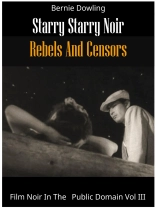In five pictorial reviews, Bernie Dowling explores rebels and censors of film noir.
Beautiful Hedy Lamarr left the studio system that devalued her talent. Censorship and perfectionism derailed her career as an independent producer.
Anti-establishment content led to the infamous blacklisting of film noir artists, but it was sexual dalliance with an in-law of a studio boss that resulted in director Edgar G. Ulmer being banished from the major studios.
Silent-film director Erich von Stroheim was banished just as the talkies began because he exceeded his allocated budget and added salacious content one time too many. He resumed acting and continued writing.
Ida Lupino was a brilliant noir actor who began her Hollywood career as a teenager and was suspended over the years for her refusal to accept inferior roles as an ingenue. Studio heads called her Loopy Lupino, but she turned in great performances in many noirs before becoming the first woman to direct a Hollywood noir.
For the first decade of his illustrious career, all the films of Japanese auteur Akira Kurosawa were censored.
First, the wartime military expungers of Imperial Japan censored Kurosawa’s works.
After the war, the American occupation military censors cast their eyes over his films. Despite the censors looking over his shoulder, Kurosawa was able to create a tough noir that stands as one of the greatest of them all. It is called Stray Dog 1949.
Об авторе
Bernie Dowling is an Australian writer of journalism, fiction, and non-fiction. His first novel is the neo-noir Iraqi Icicle. His non-fiction Maaate! Bribe Proofing The Public Purse Against Good Blokes is about corruption in local government. The author is publishing a four-book series on film noir in the public domain. The first volume Noir Dirt Cheap was published in 2023. Film Noir Fate Vs The Working Stiff appeared in 2024.












